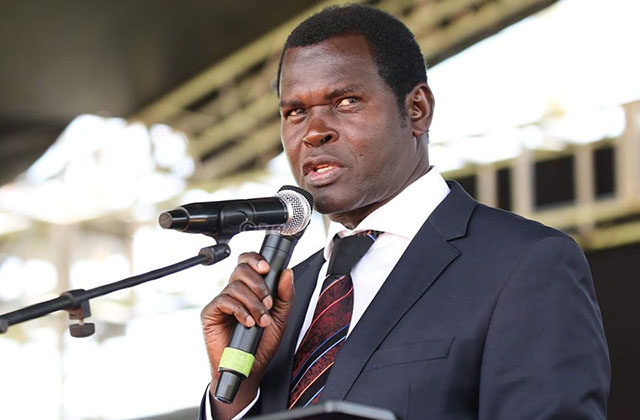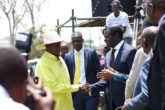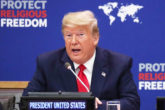
Robert Kayanja is the founder and Senior Pastor of Miracle Centre Cathedral, and CEO of Channel 44 Television. Courtesy Photo.
The state Minister of Ethics and Integrity Father Simon Lokodo made headlines around the country when he proposed a policy he urged seeks to enforce transparency and monetary accountability in religious and faith-based institutions.
The policy is necessary, Lokodo said then, adding that “it’s as a result of an outcry of the people.”
Now, for the policy document to be reviewed, Father Simon Lokodo said he held nation-wide consultative meetings to engage Pastors and relevant stake holders – and also sought tips from a Rwandan consultant who helped President Paul Kagama formulate a policy which led to the closure of over 600 Churches in the country last year.
Speaking during the first-of-its-kind exclusive interview with a local broadcaster on Tuesday, the founder of Miracle Centre Cathedral – Rubaga, Robert Kayanja expressed concern over reports that born-again Christian leaders approved the policy and gave the Minister the green light for its enactment.
Pastor Kayanja said he believes that the existing penal code, which condemns criminality and provides penalties, should be used to discipline wayward church leaders.
“This policy has been in the making for about 10 years. Our people engaged, and they told him [Father Simon Lokodo] this is not the way we want to go. But he persisted. In the last document they released a few months ago, they said everybody has signed, and that was all over the news. It was not true,” Pastor Robert Kayanja said.
Pastor Kayanja, like many other Pastors of various churches who have addressed media, believes the proposed policy targets Pentecostals. He threatened to go to court if the policy is enacted.
“The whole document is targeting a certain group of people. It is targeting born-again Churches. When you look at the way it has been framed and designed, it contravenes the constitution of the Republic of Uganda and the African convention on human rights,” he said.
“I think this policy was not brought in good faith. Its number one motive is to curtail the growth of the born-again churches and fortunately, the Holy Spirit cannot be stopped. The churches are going to be here, we are going to multiply, and we are going to grow. It’s better they withdraw the policy if they don’t, we will open charges in the courts of law, because it has no basis whatsoever,” he said.
Pastor Kayanja said if one wants to develop a public policy, that individual must have solid reasons why they are bringing it up. Mr Kayanja explained that the cause for a new policy should be backed up by evidential reports and research.
“Jesus made it very clear, ‘render to Caesar the things that are Caesar’s; and to God the things that are God’s.” He wasn’t only talking about money, he was talking about the way we live and conduct. That’s why we call it a ‘Lokodo Policy,’ because it’s really not a national policy,” he said.
“I would have been happy if he passes policies to fight corruption because it has hampered progress in this country. But then, you antagonize a very peaceful group of people, we don’t break into people’s homes. People have the choice. I think politicians forget that people have a brain, people see, people have the ability to make decisions. When people decide to join born again churches, they’ve walked from somewhere else,” Pastor Kayanja said.
Adding: “We all know that the greatest problem that Uganda has is corruption. And as a minister of ethics and integrity, how many policies has he passed to cub corruption? The born again believers are rehabilitated people. In 1986, we were just 10,000 of us in the country. Now we are 3.9 million. We’ve got people we’ve even given to government to help in terms of revenue collection. Former KCCA ED Jennifer Musisi was appointed because of [the relevant] criteria and being born again. Same thing for Allen Kagina, and many more.”
Pastor Kayanja urged Father Simon Lokodo to get to know more about the Born-again Church.
“If you are neutral on a policy you’re bringing to the people, you should first of all know their Genesis, you must know where we began. Like I labored to explain to the President, the Pentecostal Church was the first Church on planet earth which started over 2000 years ago. It may have taken long to come to Uganda, but it was born 50 days after our Lord Jesus Christ rose from the dead. And so, all other religions came from that particular church,” he said.
Lokodo’s policy, known as the National Policy on Religious and Faith-Based Organisations, would require church leaders to attain theological training from a government-recognized institution before operating a church.
That aside, Church leaders would also be required to declare their source of income to promote financial transparency.
“What about all other people Jesus met on the side of the road, Mathew was a tax collector, which theological school did he go to? I believe when religion first came here (in Africa), most of the people were illiterate. But they joined in. Apolo Kivebulaya was illiterate, and many others,” Pr Kayanja responded to Lokodo’s need for church leaders to attain theological training before opening Churches.
“When you look at it [the policy], he does not talk about Rastafarians, he doesn’t talk about Buddhists, he doesn’t talk about even mosques. It is about Churches… You can remember years back when I was accused of homosexuality and other offences? I was taken to the law. It doesn’t matter whether you’re a pastor or someone else. The judicial framework is enough, it has enough laws on the bench to deal with the things that he’s talking about,” Pastor Kayanja concluded.
According to sources, Religious leaders from the Roman Catholic Church, Seventh-day Adventist Church and Muslims already have recognized theological certificates. Some leaders of these more mainstream groups support the new policy, saying thousands of people have fallen victim to false prophets and unscrupulous pastors who extort money from poor and desperate Ugandans.
Similar policy thrown out of parliament
Uganda Christian News reported in January a section of legislators took a firm stand against a request to grant Hon John Baptist Nambeshe (NRM, Manjiya County, Bududa) leave to introduce a bill aimed at regulating religious and faith organizations in Uganda.
Hon Nambeshe said the bill entitled ‘The Religious Organizations Bill 2019’ seeks to provide a legal framework for registration, regulation and management of religious organisations.
Speaking against the request, a section of legislators said “matters of religion will be tricky to regulate.”
“Religion is a matter of faith and calling from God, we cannot sit here and constitute ourselves into a bureau that would act as a small god to regulate religious activities,” Buvuma Woman MP Janiper Nantume noted.
As much as Hon Nambeshe asserted the proposed Religious Organizations Bill doesn’t contradict with constitutional provisions on freedom of worship, the matter raised a lot of emotions prompting the speaker, Rt Hon Rebecca Alitwala Kadaga to defer the debate.
‘We need to be informed to inform others’
Elsewhere, Founder at Christian Restoration Ministries International Ap. John Bunjo took to social media and said training for “gospel ministers is in line with the scriptures.”
He explained that “you don’t need to trained to be called, but after calling, you need training.”
“There are three stages of ministry; Calling, training and sending,” he said.
“If you read carefully, Elijah had a school of prophets, studying in those days was so much about having read and crammed the five Books of Moses and no one qualified until he had passed that. For those days, that’s how it happened but as the world develops, different approaches and methods had to change to where we are but the bottom line is we need to be informed to inform others.” he said.
His remarks however did meet objection from some of the readers.

